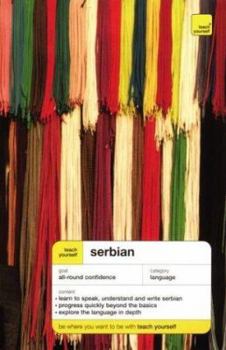Teach Yourself Serbian Complete Course (Book Only)
Select Format
Select Condition 
Book Overview
Learning Serbian as easy as 1-2-3 With this book, Serbian is attainable for any beginning student. You can use Teach Yourself Serbian Complete Course at your own pace or as a supplement to formal... This description may be from another edition of this product.
Format:Paperback
Language:English
ISBN:0071420290
ISBN13:9780071420297
Release Date:July 2003
Publisher:McGraw-Hill
Length:224 Pages
Weight:0.81 lbs.
Dimensions:0.9" x 5.1" x 7.8"
Customer Reviews
1 rating
Very usefull indeed!
Published by Thriftbooks.com User , 20 years ago
In this review I'll try to provide a brief overview of a. The Serbian Language b. Teach Yourself Serbian a. The Serbian Language 15 years ago you wouldn't have found any course in Serbian, only in Serbo-Croat. For almost all of the 20th century the term Serbo-Croat covered the language(s) spoken by Croats, Bosniaks, Serbs and Montenegrins. Today there is no agreement on whether there are one, two, three or four different languages. Most people recognise the existence of Croatian and Serbian and tent to view Bosnian and Montenegrin as Serbian varieties. I'm not from the region and I don't have any national feeling involved in this issue. Neither do I have any definite answer, but I can say this: - Serbs, Croats, Bosniaks and Montenegrins can all understand each other. Just as Danes and Swedes or Czechs and Slovaks can understand each other. - The difference between the forms is large enough to give away whether you're a Croat, a Serb, a Bosnian or a Montenegrin. The difference is definitely larger than between various English dialects. The most obvious difference is between "ekavian" and "ijekavin", two different dialect named after their realisation of "e". In Ekavian: milk = mleko, river = reka, village = selo In Ijekavian: milk = mlijeko, river = rijeka, village = selo In other words, not all "e"s are "ije" in Ijekavian but you get the picture. Now, all Croats, all Bosniaks and all Montenegrins use Ijekavian. So do many Serbs. The majority of the Serbs use Ekavian, though. In other words, all Ekavian-speakers are Serbs but not all Serbs are Ekavian-speakers and all Croats are Ijekavian-speakers but not all Ijekavian-speakers are Croats. Another difference is the vocabulary. Croats are Catholics, Bosniaks are Moslems and Montenegrins and Serbs are Orthodox. Another big difference is that Serbia and Bosnia first came under the influence of Greece and later were part of the Turkish Empire for hundreds of years. Croatia first came under the influence of Italy and later was part of the Austrian empire for hundreds of years. Naturally this has left its traces. Many religious words in Serbian are Greek, in Bosnian they're Turkish/Arab and in Croatian they're Latin. Apart from the religious vocabulary there are some other words that differ. Croatia has one set of words whereas the others have another set. In short, the picture looks like this: Croatian: Ijekavian, religious vocabulary based on Latin, Croatian-set. Serbian: Ekavian (mostly), religious vocabulary based on Greek, Serbian-set. Bosnian: Ijekavian, religious vocabulary based on Turkish, Serbiat-set. Montenegrin: Ijekavian, religious vocabulary based on Greek, Serbian-set. Just keep in mind that there are differences but that people understand each others. I've learned Croatian but Serbs have expressed delight over how well I speak Serbian... b. Teach Yourself Serbian This course is great! There aren't many Serbian courses on the market, but even if there were this one would st





